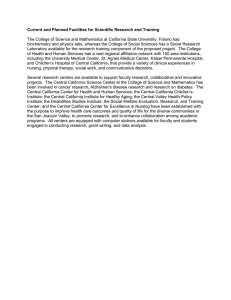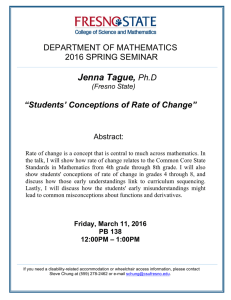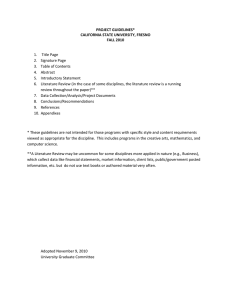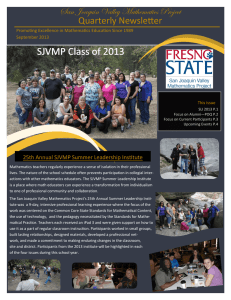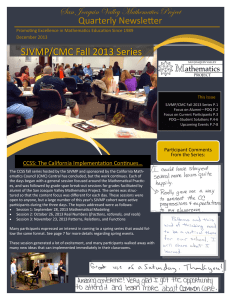Winter Leadership Retreat 2014 San Joaquin Valley Mathematics Project Quarterly Newsletter
advertisement
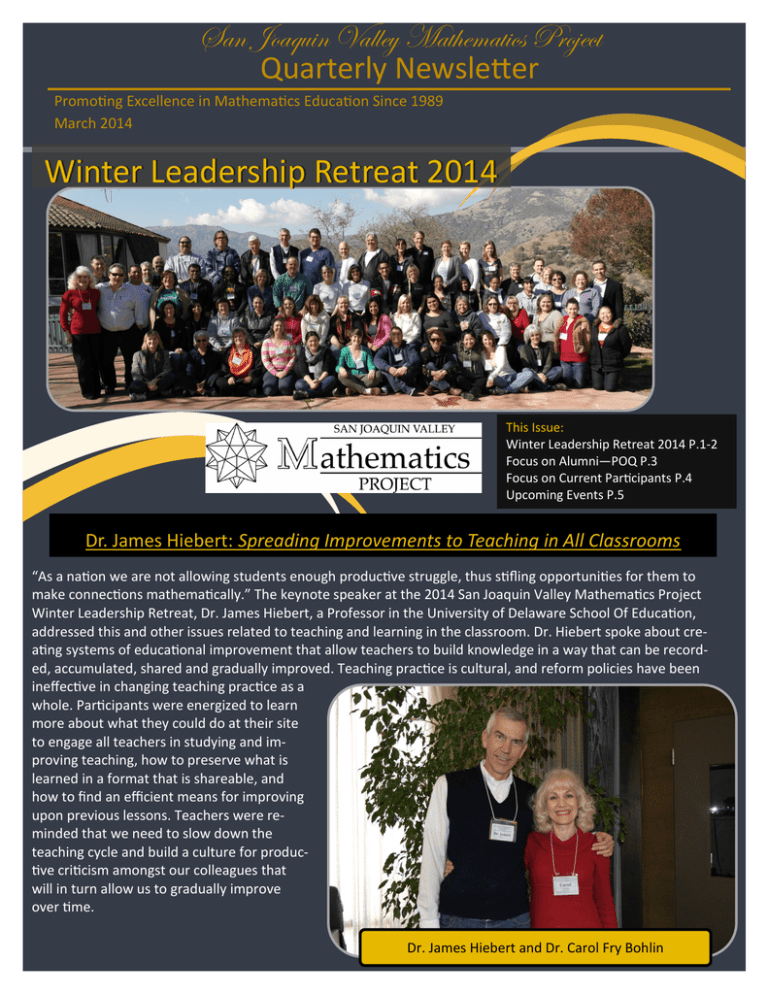
San Joaquin Valley Mathematics Project Quarterly Newsletter Promoting Excellence in Mathematics Education Since 1989 March 2014 Winter Leadership Retreat 2014 This Issue: Winter Leadership Retreat 2014 P.1-2 Focus on Alumni—POQ P.3 Focus on Current Participants P.4 Upcoming Events P.5 Dr. James Hiebert: Spreading Improvements to Teaching in All Classrooms “As a nation we are not allowing students enough productive struggle, thus stifling opportunities for them to make connections mathematically.” The keynote speaker at the 2014 San Joaquin Valley Mathematics Project Winter Leadership Retreat, Dr. James Hiebert, a Professor in the University of Delaware School Of Education, addressed this and other issues related to teaching and learning in the classroom. Dr. Hiebert spoke about creating systems of educational improvement that allow teachers to build knowledge in a way that can be recorded, accumulated, shared and gradually improved. Teaching practice is cultural, and reform policies have been ineffective in changing teaching practice as a whole. Participants were energized to learn more about what they could do at their site to engage all teachers in studying and improving teaching, how to preserve what is learned in a format that is shareable, and how to find an efficient means for improving upon previous lessons. Teachers were reminded that we need to slow down the teaching cycle and build a culture for productive criticism amongst our colleagues that will in turn allow us to gradually improve over time. Dr. James Hiebert and Dr. Carol Fry Bohlin More Winter Leadership Retreat 2014 Photos All Smiles - WLR Rocks! Past and Current Project Directors from left: Dr. Carol Fry Bohlin, Lori Hamada, Lisa Portela, Karen Arth, and Mike Chamberlain Tony edifying others to share pedagogic practices Team Brad and Jon Collaborative Work Jason expounding upon the virtues of active listening. Participants working with Dr. Jeanie Behrend Jay showing off his sculpting talents Focus on Alumni Each issue, we will focus on an accomplished SJVMP participant from the past 25 years to comment on the impact the Math Project has had on his or her career. Bob participated in the SJVMP Summer Leadership Institute in 2000. Bob is currently teaching math at Rio Vista Middle School in Fresno, CA. SJVMP: If I were to interview you a year from now, what should I expect that you would have accomplished in the 2014-2015 school year? Bob: You would find that I have incorporated technology and multimedia to a high degree in my classroom to increase student engagement and their understanding of math. Also, I have learned to teach geometry through the lens of transformations. On a personal note, I weigh less. When have you been most satisfied with your teaching? Bob: The years I enjoyed teaching the most were at Central High School West Campus when it reopened after its refurbishing. I really liked the smaller population of about 600-800 students. Everyone knew everyone. It felt like family. I was also able to connect with more students and teach many of them for multiple years. I had a lot of fun and success. Who is your role model in this profession, and why? Bob: Diana Herrington is my role model. She was the teacher who inspired me to begin teaching. She was always trying new things and refining her teaching. She is also very active in the math community. If you know her, she is kind of “a force of nature”. If I ever become half the teacher she is, I will have become a great teacher. Oh, she also talked with Bill Gates. He’s hasn’t called me yet. Describe for us some activities that you do not like to do in your classroom. Bob Mohler (Continued on Page 3) Problem of the Quarter (POQ) Each quarter we invite teachers and their students to submit solutions directly to the Director, Mike Chamberlain, via email at: mchamberlain@fcoe.org. Handwritten solutions can be scanned and submitted via email. Selected solutions will be published in the next issue of the newsletter. Correct solutions must contain both an answer and a viable justification. Current Problem (Grades 6-8): Madison loves eating hot wings. So she looked up a recipe on the Internet. She found a site that helped her out with this dilemma: https://www.franksredhot.com/info/faq. Here is some information Madison found on this page: Question: How can I make sure the wings I serve have the authentic flavor of Buffalo? Answer: Frank's RedHot Original Cayenne Pepper Sauce was the secret ingredient in the first ever Buffalo Wings recipe. To give your wings authentic Buffalo flavor, use 3 parts Frank's RedHot Original and 2 parts melted butter. Toss your wings in this mixture and serve. If Madison wants to make wings for a rather large party, she will need a total of 3 gallons of Buffalo Wing sauce. She wants the authentic flavor mentioned above. How much Frank’s RedHot Original and how much butter should she use to make her recipe? (You can answer in cups, pints, quarts, or gallons) Focus on Current Participants Zharida is currently a mathematics coach at Parlier Jr. High School in Parlier, CA. Zharida DeFendis SJVMP: Going through the SJVMP pictures, it was evident that you brought energy and fun to the program? Tell us about this. Zharida: Aside from simply being a happy person, I actually enjoy learning, especially when it involves interactive and hands-on activities. Growing up, my parents taught me to value education and not take it for granted. Hence, I enthusiastically give my best effort and am appreciative for every moment that I gain new learning experiences because they help me become a better educator and person in general. Your work as a coach at Parlier Jr. High is important. What would you like to leave there as a legacy? Zharida: I want to be remembered as the teacher coach who always had that contagious smile, optimis- tic attitude, and long lasting energy in doing whatever it takes to support the students, teachers, administration, staff, and parents productively and efficiently. Give an example of an idea you've had or implemented as a result of your experience with the SJVMP. Zharida: Our math department has implemented a lot of ideas that we have learned from SJVMP. We have implemented many of the lesson activities and study team strategies that Karen Arth used in the 2012 SLI. We have also used the CCSS resources from FCOE presented by Carl Veater. Our teachers have also been taught lessons using the tape diagram and fractions in the number line activities learned from the 2013 SLI. It was also through SJVMP that I was given my first opportunity to be a presenter at a CCSS workshop breakout session outside my school district. Why mathematics? What inspires you stay in this field of work? Zharida: My favorite subject ever since I was in elementary was math. I enjoy finding patterns, working with numbers and solving problems. I want to share this with students and help them realize how fun mathematics is. Tell us about your goals for the 2014-2015 school year. Zharida: My main goal for 20142015 is to provide enhanced support to the math teachers and students in the full implementation (Continued on Page 5) Focus on Alumni (continued from page 3) Bob: I do not like to regurgitate-teach; where I tell the students something and have them repeat it back. I prefer to tell my students something and have them use it in a new or unexpected way to solve problems. And after 24 years of teaching, grading is not a high point in my day. Tell me about an accomplishment that you consider to be one of the most significant in your career as a classroom teacher. Bob: I once had a student who told me “Do you remember that time you talked to me after lunch. Well, I really thought about what you said and I quit doing drugs and I’ve straightened out my life.” I remember having talked to him on numerous occasions, but I’m not sure what I said that worked. I was just glad that it did. Recall a favorite SJVMP experience. Bob: The campfire meeting at the summer institute. It was very powerful and changed my life. Some of us know you as “Radical Man.” Do you still get asked about your many years as a TV personality? I don’t really get recognized any more. I still have the occasional student who tells me they use to call into the show and ask if I remember them, but it is safe to go into public again. Focus on Current Participants Upcoming Event 26TH Annual Summer Leadership Institute California Mathematics Project at Fresno State - San Joaquin Valley Mathematics Project July 8 – 18, 2014 The 2014 Summer Leadership Institute will kick off a year-long professional learning opportunity for mathematics educators in the Region VII area. This nine-day experience will further develop teacher content knowledge as well as inspire pedagogical shifts in the classroom as the implementation of the Common Core continues. The institute is designed to empower teachers in and out of the classroom to take on leadership roles at their site or district. Participation in this event will include free registration to the other major events put on by the San Joaquin Valley Mathematics Project throughout the 2014-2015 academic year. This year will include the Winter Leadership Retreat, Technology Day, and the Equity and Access for EL Learners Day. Participants will also receive a complimentary Teacher Edition of the popular TI-Nspire CAS Computer Software, along with training from a local Texas Instrument T3 Regional Trainer. Location: Commuter Portion at Fresno State: July 8 (Orientation), 14-18 Residential Portion at Cayucos, CA: July 9-11 Winter Leadership Retreat : January 30 30--31 at Three Rivers, CA Technology Day: Fall 2014 at Fresno State Equity and Access Day (EL Focus): Spring 2015 at Fresno State Registration: Deadline - June 15, 2014. Applicable late fees apply. Cost: $1500 Registration Link: http://fresno.k12oms.org/141-81156 PROJECT DIRECTOR Mike Chamberlain mchamberlain@fcoe.org ADMINISTRATIVE ASSISTANT May Lee mayl@csufresno.edu San Joaquin Valley Mathematics Project California State University, Fresno Kremen Education Building Room 242 5005 Maple Ave., M/S ED 2 Fresno, CA 93740-8025 (559) 278-1082 office (559) 278-0107 fax (continued from page 4) of the CCSS, including the integration of technology and student engagement structures in the lesson activities by being in the classrooms observing, coaching, doing demo lessons, and/or coteaching regularly throughout the school year. What do you like to do for fun? Zharida: I enjoy playing “around the world” table tennis with my church group after Bible study on Tuesday nights. I also love singing karaoke at home. Having participated in the SJVMP for several years brings insight into the nature of the program. What type of person gains the most from our program? Why do you think that is? Zharida: I think that a person who is willing to learn and try new things will gain most from the program whether he/she is a new or veteran teacher, elementary or secondary teacher, and with or without a math degree. What is the impact that you hope your work has at the student level? Zharida: I hope that my work will increase student engagement. Most importantly, I hope to see students having a fun time learning mathematics.
